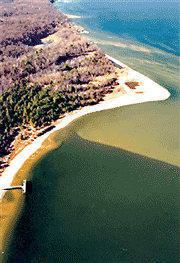The Work We Do Is Ground Away
But each day is a birthing of new possibilities
by Elizabeth Ayres
Today they call it Flag Ponds Nature Park, but yesterday — some 12 million years ago — it was an ocean where sharks hunted and whales met to give birth. Yesterday — some 50 years ago — it was a Bay harbor where watermen fed their families by catching fish in pound nets to sell in Baltimore. And yesterday — just a week ago — it was a beach where a smattering of folk searched for fossils. And yesterday — just 24 hours ago — two high tides brought new sand to the shore.
Tomorrow — maybe 50 years from now — today’s beach will have turned into forest. And tomorrow — maybe 12 million years from now — today’s folk might have no language to describe what will be here. Or perhaps they’ll call it ocean once again. Or perhaps there will be nothing left but the silence from which it all emerged.
I think too much, I know that. While all those nice people combed the beach looking intently for black triangles fallen from the mouth of a Miocene-era shark, I sat morosely in my little chair just beyond the wrack line, staring at the debris the waves had ground, grated and pulverized into an homogeneous heap of white chips, black bits and gray smithereens. Somewhere in all that rubble a treasure could be found, but I could summon neither hope nor industry in the face of such an impossible task. I left.
On the path back to the parking lot, I stopped to read the signs. I especially loved the one about how the boundaries between beach and dune, shrub and forest habitats are constantly shifting. And the one about the pioneer plants — the ones that can thrive in poor, sandy soil, reclaiming for land what belonged to the sea — struggling with it, changing it, until other, less hardy vegetation can take root in the now fertile earth.
I noodled around at the Buoy Hotel, an old shanty left over from when the pound-net fishermen would camp out, February through November every year. Such hard labor. To cut and haul 50-foot poles from the forest. To hammer them into the harbor floor, 130 to support just one net. To trap the fish, scoop them into a boat, box them up for shipping. To mend the nets, keep the boats repaired, cook for themselves in cast-iron skillets, make coffee in battered tin pots, drop into sleep on rough-hewn bunks under hand-made quilts, the day’s work sweetened by dreams of hearth and home.
Back at the Visitor Center, I studied display cases filled with sand dollars, coral, leaf imprints, crocodile teeth, dolphin ear bones, stingray dental plates, whale vertebrae, bones, petrified wood and Piscataway Indian fishing weights. Jumbled together without the neat labels, those precious artifacts would collapse into a homogeneous heap of white chips, black bits and gray smithereens.
I confess, it frightened me. If all my yesterdays are waves that grind and grate and pulverize — if this present moment is the wrack line — how will I ever know what to cherish, what to dismiss, what to keep, what to toss aside?
Labor Day is upon us. It’s supposed to be a tribute to the social and economic achievement of American workers. You know. The highest standard of living, the biggest gross national product, the best form of government. Ours is a country of superlatives, okay, but 37 million Americans live below the poverty level, 47 million lack health insurance.
It seems to me we’re living in an era of shifting boundaries, with some new pioneer behaviors called for if we’re to avoid the fate of those men who worked at the Buoy Hotel. Today, in a tree-framed pond, you can see the derelict pilings that yesterday had been their pier, before the sand bar took over, before the encroaching thrusts of spurge and thistle. Their labor is at an end, but ours is just beginning: a birthing of new possibilities this day so that dreams of hearth and home can endure unto tomorrow.
Poet and writing teacher Elizabeth Ayres (CreativeWritingCenter.com) is the author of Writing the Wave and Know the Way. She last reflected for Bay Weekly for the summer solstice in The Swash Zone [Vol. 15, #25; June 21, 2007]. Listen for Elizabeth’s radio program, Soundings, Saturday evenings from 6:00 to 6:30. Starting Sept. 15, you can tune into WRYR 97.5 FM or catch it on the web at www.wryr.org.
